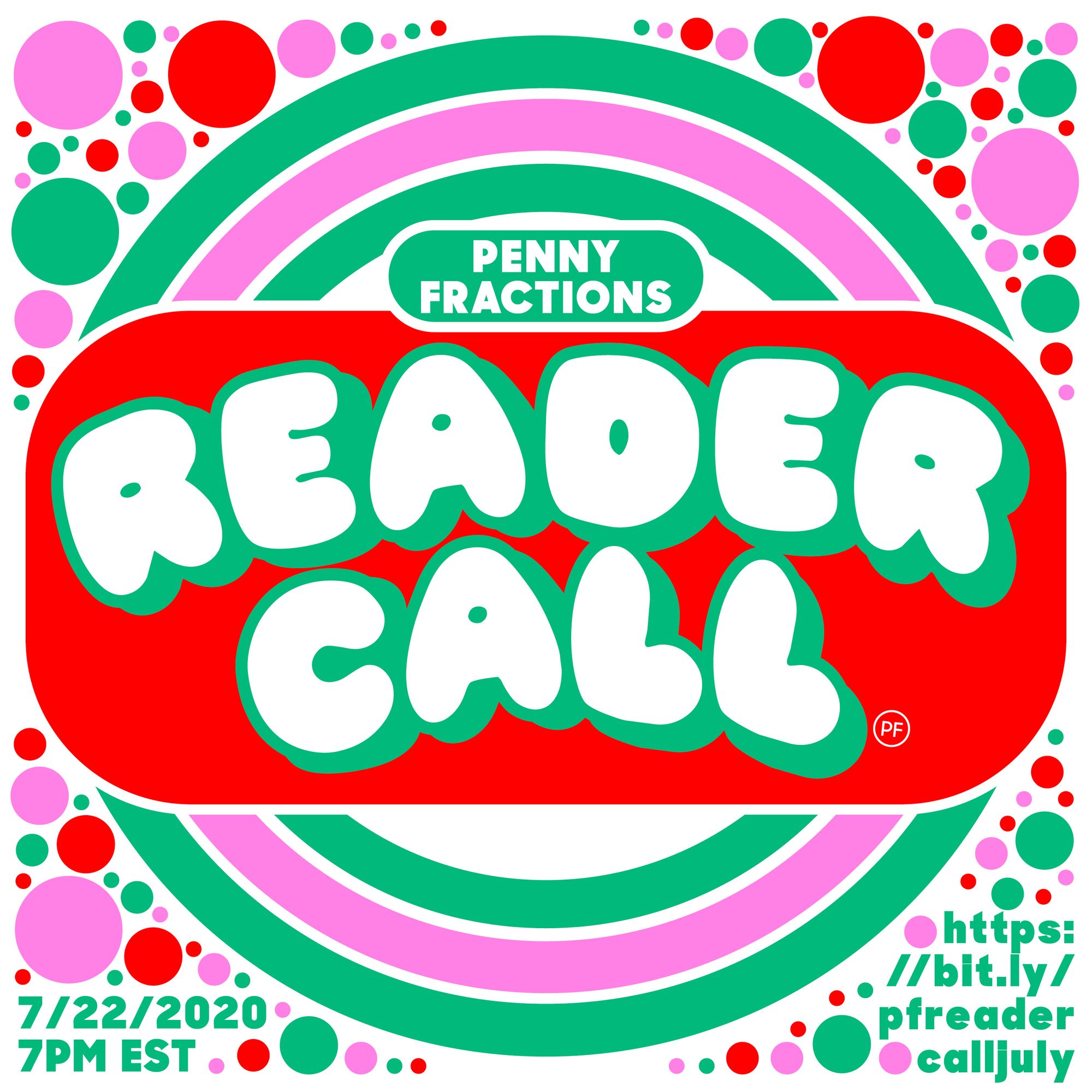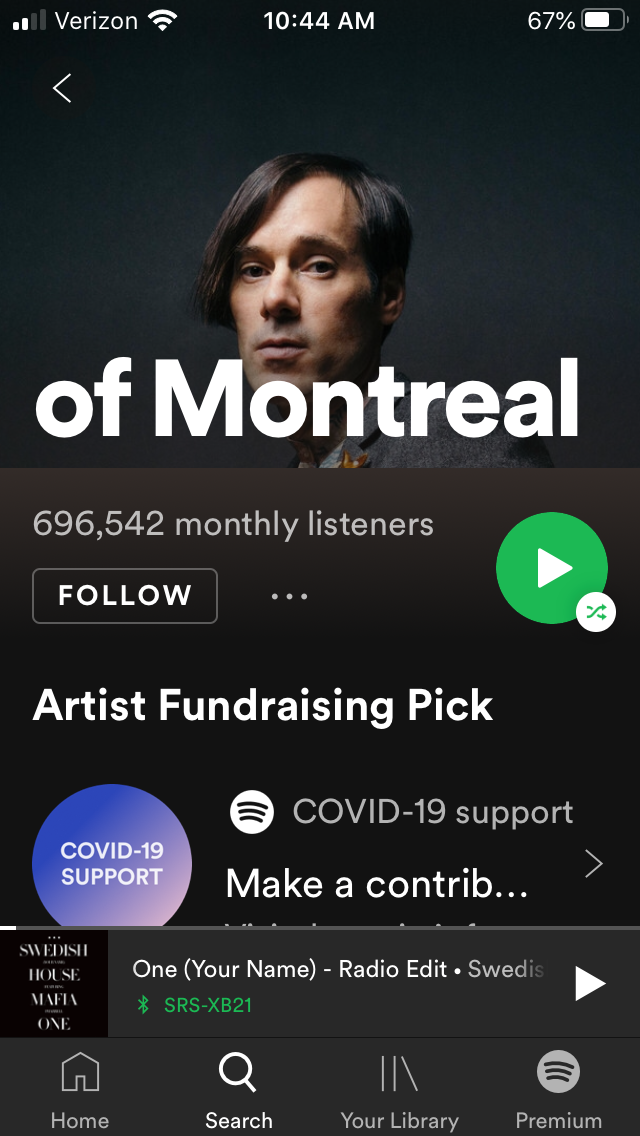Do Musicians Want a Tip Jar?
Hello, readers! Excited to be back from my early summer vacation. A few updates before we get to this week’s newsletter: in June, I was interviewed for the Creative Independent and appeared on Holly Herndon and Mat Dryhurst’s podcast, Interdependence. These were wonderful chats and a number of new subscribers arrived post-interviews, so if you’re a new reader, check out my back catalog of newsletters. I’ll also be hosting another reader call next Wednesday at 7pm EST, which you can sign up for right here. Kurt Woerpel, Penny Fractions’ go-to graphic designer, made a lovely graphic that you’ll see below for the event. But enough self-promo, let’s talk about the politics of digital tipping…

A Life of E-Busking
During the early days of the coronavirus crisis, there was a sudden rush to figure out what music’s biggest platforms could do to help artists. Spotify, SoundCloud, and TikTok announced their own ways for fans to give donations through their platforms. The rush to do that caused a bit of consternation amongst musicians suddenly asked to reorient their lives during a pandemic, towards a completely different mode of monetary compensation than was offered pre-crisis. Mat Dryhurst, a sharp critic of the current record industry, compared the idea of artists asking for digital donations to busking, “e-busking” if you will.
Dryhurst’s issue with e-busking wasn’t about asking directly for money, rather it was a bit more granular. He pointed out that unlike a street musician, there isn’t a steady flow of new people coming towards an artist. That level of reaching a new audience is already an issue for many artists in a world where music streaming is dominated by three major labels on a handful of platforms. There is a whole industry of public relations and promotions designed to assist artists in finding an audience of people for their music, which already costs money. The tension of needing to pay money to reach more people with one’s music is already a core issue within recorded music and isn't addressed with a donation button.
Current digital platforms lack a centralized way for new people to discover one’s music, and even if that were accomplished, it’d cede a lot of power to non-artist minded platforms, which happened with mixed results to Myspace and Facebook. Subscription-based modes of payment like with Patreon, Ampled, or even Bandcamp are far more sustainable than reliably securing one-off donations. Still, I share many of Dryhurst’s concerns, which are only amplified when one actually looks at the donation experience with the Spotify app.
The Joy of Corporate Giving
Now, let’s be clear about what Spotify’s donation button is and isn’t. Spotify provides artists the ability to put a link on their profile page. Artists are given the choice of what platform they want to use for money transfers, but the button isn’t created by Spotify, and so they hold no involvement in the monetary exchanges. This feels important to note when looking at the actual layout of the artist page.

Just to drill down a bit on the messaging here, Spotify chose two phrases: “Artist Fundraising Pick” and “COVID-19 support”. The former may imply that the artists are directing fans towards a charity of their choosing; while the latter could go either way or suggest that the support is for the artist or a charitable group. This might be a bit minor, but Vice reported that a number of musicians expressed skepticism towards how the button was presented. Spotify did not make it clear how long the button would last, there was trepidation about how it so brazenly asks for donations, and the company also showed concern over the labor exerted to push fans towards this new form of interaction.
These rather immediate issues could point towards the relatively little buy-in from either artists or fans, as there have been few reports or exclamations from artists receiving any significant payments from the button at all. (Personally, I’ve only heard at best tepid donations given.) Yet, it isn’t shocking per Dryhurst’s observations that this form of e-busking isn’t even advantageous compared to the position of a street musician. He noted on Twitter that the ability to seek out new audiences and engage in normalized performances hold advantages to just tossing a Spotify link onto one’s profile page and hoping someone sees it and feels charitable. (Obviously, a better society would properly compensate street musicians, so their work wouldn’t even need such donations.)
Digital tipping is certainly finding success on livestream platforms like Twitch/YouTube, along with smaller players in that space. Again, where fans can both offer monthly subscriptions, one-off donations, and where the platforms cater to allowing rewards and perks for those that do donate. In many ways, it’s unfair to compare e-busking to these other platforms, but observing the shortcomings can help articulate what might be needed to make this model work if artists would want to pursue it.
Other examples of donations can be found with the Tencent-owned QQ Music, and even Instagram-created, similar to TikTok, donation stickers. Still, at least for American music fans, this form of compensation is not the norm. I certainly could see the American record industry adopting additional forms of monetary donations for artists. Yet, until a company makes that central to its platform, the industry will keep experiencing this awkward tension. (All of the chatter about Fortnite and the record industry would suddenly make a lot more sense in this context, as video games figured out this model years ago.)
Dave Benton, from Trace Mountains, told Vice: “In an ideal world, creators wouldn't need to work for tips on for-profit platforms. I think the only reason it's necessary is because of the power imbalance between the musicians and the platforms that profit off of the collective value of their work.” The issue at its most high level is that this shows just how little power artists have and how much rests in the hands of tech platforms. This is what Liz Pelly covered when comparing Spotify’s view of musicians to Uber’s mistreatment of drivers. The issue isn’t with e-busking but rather it arrived top-down, not from organic artist demands and in many ways already feels like a discarded idea.
Unheard Labor
An extremely British edition of news today. The British government last week announced a £1.57 billion “rescue package” for the cultural/entertainment industries. Now, the actual specifics will show the effectiveness of such efforts but great to see money headed in that direction. Meanwhile, in the United States, the National Independent Venue Association pulled together a coalition from the Future of Music Coalition, RIAA, Spotify and many others to demand the federal government support small venues. The other bit of news is that the UK’s Labour Party endorsed supporting the user-centric streaming model, which was previously adopted by the Musicians’ Union. I’ll give a shout out to Matthew Whiteside, a Penny Fractions reader, who spoke at the Musicians’ Union’s 2019 conference in support of this more equitable form of payouts.
A Note of Financialization
Earlier this year, Epic Records artist Travis Scott did a digital promotional event in the video game Fortnite. The event, regrettably (at least to this industry commentator) got a lot of press. Last week, Sony, the parent company of Sony Music and owner of Epic Records, invested $250 million into Epic Games, the creators of Fortnite. Now, one may remember that Sony/ATV Music Publishing owns a small stake in Tencent Music, which is owned by Tencent, which owns 40% of Epic Games. I’d say this undermines competition across multiple industries but I’m not a government regulator. The other bit of sad news is that SiriusXM bought the podcasting company Stitcher for $265 million. With additional regret, the rapid consolidation of the podcast industry continues.
6 Links 2 Read
How Major Music Companies Are Depending on Debt and Credit to Weather the Pandemic - Billboard
Quick summary: Massive firms can burrow and build up debt, while smaller companies will be pushed to the brink of insolvency during this crisis. Good to know.
Tiered Governance and Demonetization: The Shifting Terms of Labor and Compensation in the Platform Economy - Social Media + Society
A journal I often cite, Social Media + Society, released a paper examining labor concerns and the practices of YouTube over the last few years. The paper isn’t directly about musicians, but YouTuber’s frustration with the platform’s opaqueness should ring familiar with those in the music world.
What Kind of Year Will It Be for the Record Business? The Forecasts Are Getting Worse, Not Better - Rolling Stone
There appears to be solid evidence that streaming, and even vinyl sales, are going to continue on their upward trajectory despite the coronavirus pandemic. Now, the rest of the business appears to be a slightly more precarious space as licensing, merchandise, live music, and many other parts of the biz continue to be in free fall. I’ll reiterate that while there are too many stories about one-off illegal raves and drive-in concerts until cross-country and international touring are back, these are going to be rough times.
The TikTok War - Stratechery
I broadly dislike war metaphors when talking about corporate infighting, since their enemy is ultimately workers, but Thompson at least establishes some stakes to justify the posturing. He lays out the various players with a vested interest in TikTok's future and perhaps what the United States government and companies like Apple should do. Now his circling back to the phrase “marxism” and American “liberalism” are some personal red flags, but with India banning TikTok and Amazon briefly asking its employees to remove the app, the tensions are certainly rising.
What’s Sony Planning in Music — and Will It Involve Tencent? - Rolling Stone
Narratives that center two corporations fighting is often worth questioning. One might feel even more reason to poke holes, when the two companies have publicly expressed a desire to work together. Ultimately, the losers in a world where Sony and Tencent acquire more companies and invest deeper into the potential competition are musicians, workers, and consumers. (Even though I’ll say the stories like this would imply someone would like for Sony’s “independence” from Tencent to be worth more than I’d say.)
Good Vibrations: How Bandcamp Became the Heroes of Streaming - The Guardian
Chal Ravens, thankfully, didn’t just write a press release for Bandcamp. She found a couple of dissenting voices from perspectives you don’t often hear on the company, which even received good press in the Financial Times.